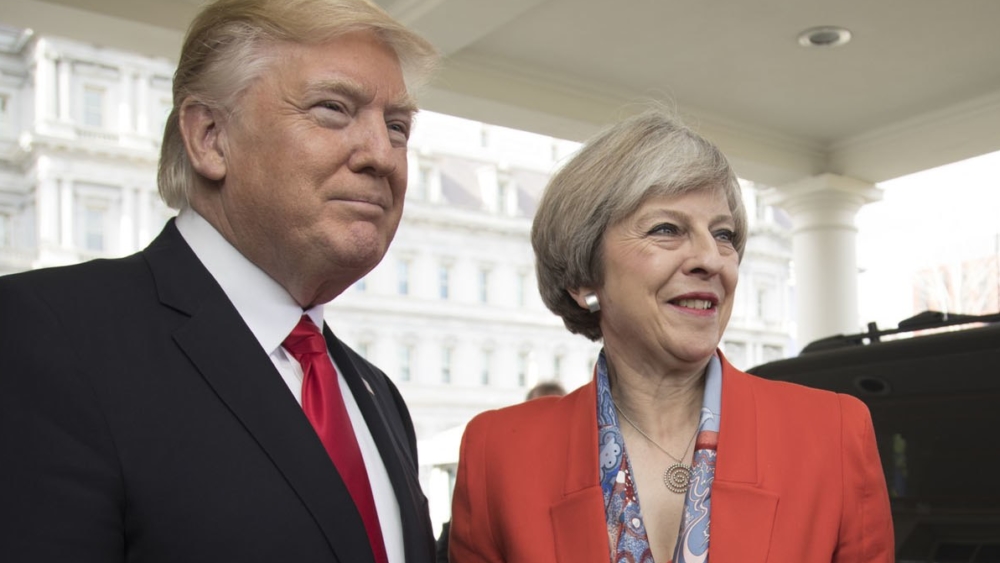Being a Christian in politics ‘harder than ever’
Trump, May and the danger of faith on the front bench
If you know anything about British politics, you’ll know that faith and public office don’t mix well. “We don’t do God,” were the words famously used by PR adviser Alastair Campbell when a journalist began probing into the religious convictions of former Prime Minister Tony Blair.
And last year, Tim Farron resigned as leader of the Liberal Democrats after enduring months of questions about his views on gay marriage. He was “torn between living as a faithful Christian and serving as a political leader,” he said at the time.
But British Prime Minister Theresa May, a minister’s daughter, is a Christian and says her faith “is part of me … and therefore how I approach things”. So is it possible to “do God” and politics – and live out faith as Christians serve in public life?
Nick Spencer thinks so. Spencer is Director of Research at Theos, a UK think tank that advocates for the place of religion in society.
“There are no shortage of Christians in public life,” says Spencer about the UK. “After all, with Tim Farron and Theresa May we’re talking about leaders of parties – so it’s not that debilitating. But being a Christian in politics is harder than ever.”
The closer you get to the front benches, “the more you are deemed to be dangerous.” – Nick Spencer
Nick Spencer will be coming out to Australia next month to give the Richard Johnston Lecture on 14 March in Sydney and 15 March in Melbourne. His theme is ‘Christianity, secularism, and the individual,’ as he looks at the influence of Christianity in the world.
Spencer says that over the past 50 years, places like the UK and Australia have moved from a normative Christian culture to a liberal secular outlook. Prevailing views on issues of personal morality, such as gender, sexuality and the beginning and end of life, have shifted. This has meant that mainstream, orthodox Christian beliefs are now sometimes seen as extreme.
Holding those views on the back benches of parliament is tolerable, but the closer you get to the front benches, “the more you are deemed to be dangerous,” says Spencer.
“The irony is that Christians are less likely to survive in liberal politics.” – Nick Spencer
However, Christians do survive in politics. Spencer believes that this survival depends upon what you focus on – and whether you’re on the left or right. “If you have a particular commitment, as many Christians do, to tackling climate change or reducing global inequality or building up institutions of civil society, you are much less likely to be condemned,” Spencer notes.

“The irony is that Christians are less likely to survive in liberal politics. Had Tim Farron’s views been expressed on the Tory benches, people wouldn’t really have batted an eyelid. But his party, whose name at least is associated with tolerance, didn’t tolerate him.”
Spencer has commentated on British politics for many years; his books include The Political Samaritan: How Power Hijacked a Parable and Freedom and Order: History, Politics and the English Bible. He’s been called “a prophet crying in the post-modern wilderness” by respected news journal, The Economist. But asked whether he’d throw his hat in the ring and pursue a political career, Spencer’s answer is emphatically no. “There are so many reasons why not,” he says. “I’m much more comfortable researching, writing and thinking than campaigning and policy-making. Also, frankly, I don’t have thick enough skin.”
Instead, he concentrates his efforts with Theos on, as he describes it, “changing the climate of public opinion about Christianity and faith”. Similar to the Centre for Public Christianity in Australia, Theos’s nine-strong team does this through thoughtful research, debates and lectures, as well as insightful media work.
The aim is to see constructive, diverse and informed debate about faith and politics – so that Christianity can be a force for good in society.
The context couldn’t be more different from the political landscape in America, where President Donald Trump’s approval rating among white evangelical Christians is nearly twice as high as his rating with the general population.
“A massive Christian constituency rallied to his support, despite the fact that he stood for nothing they really agreed with,” says Spencer. “It left people very angry at some Christians. But the general consensus is that Trump’s faith is paper thin, so when you object to him you can’t really pin the blame on Christianity.”
“Religion is going to play a very significant part in 21st-century global politics.” – Nick Spencer
As the world grows increasingly divided, with social media reinforcing polarised views, the challenge for Christians in politics will continue. But the Bible has influenced political thought for generations – and Spencer doesn’t believe that will change in the future.
“Religion is going to play a very significant part in 21st-century global politics,” he says. “There are vast numbers of Christians in sub-Saharan Africa; in the Middle East, the impact of the Arab Spring is still being felt.
“China has at least 100 million Christians and is undergoing a revival no one thought possible 30 years ago – and, at the same time, this nation is emerging as a global leader. It mirrors Britain in the 19th Century, and America in the 20th Century; countries that dominated global politics with a distinct Christian flavour. The cycle of Christian influence goes on.”
Claire Smith is a freelance writer based in London.



